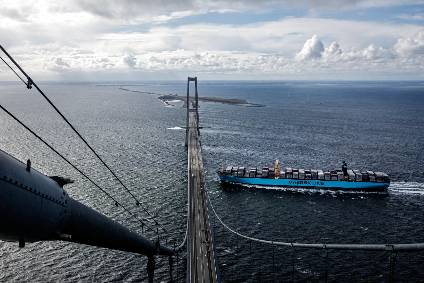
Shipping prices will go up for Maersk customers as the logistics provider gears up for a new regulation that ultimately sees it lower the environmental impact of its operations.
At present, ships are able to use fuel with up to 3.5% sulphur content. However, from 1 January 2020, this will be capped at 0.5%.

Discover B2B Marketing That Performs
Combine business intelligence and editorial excellence to reach engaged professionals across 36 leading media platforms.
The regulation has been developed and adopted by the International Maritime Organisation (IMO), which is a specialised agency under the United Nations (UN). It will reduce sulphur pollution from shipping by more than 80%.
To become compliant shipowners will have to invest in compliant fuels, LNG or scrubber technology. This is expected to lower global shipping’s sulphur emissions.
In a statement issued Monday (17 September), Maersk Line said it fully supported the regulation and its preparations to ensure compliance were “well underway”.
It did, however, warn the cost of compliance would be “significant” and that these would be passed to the customer in the form of price increases.

US Tariffs are shifting - will you react or anticipate?
Don’t let policy changes catch you off guard. Stay proactive with real-time data and expert analysis.
By GlobalDataIt is also expected that the volatility of fuel costs for shipping will increase as the regulation enters into effect, Maersk added.
“We fully support the new rules. They will be a significant benefit to the environment and to human health,” says Vincent Clerc, chief commercial officer, A.P. Moller – Maersk A/S. “The 2020 sulphur cap is a game changer for the shipping industry. Maersk preparations to comply are well underway and so are our customers’ efforts to plan ahead. The new BAF is a simple, fair and predictable mechanism that ensures clarity for our customers in planning their supply chains for this significant shift.”
The regulation will bring increases and uncertainty to fuel costs for shipping. The BAF surcharge is designed to recover increases in fuel-related costs. It will be charged separately from Maersk Line’s freight rate.
In order to allow customers to predict, plan and track how changes in fuel price will impact total shipping freight rate, Maersk Line is introducing a Bunker Adjustment Factor (BAF). The new BAF will replace the existing Standard Bunker Factor (SBF) and allow customers to simulate and calculate the BAF tariff at any fuel price for a given trade route. It will come into effect from 1 January 2019.
The BAF tariff is designed to recover fuel-related costs, and it will be charged separately from the basic ocean freight as the fuel cost is a very significant and volatile part of shipping costs.
The BAF consists of a trade factor and the fuel price: Fuel price x Trade factor = BAF
The fuel price is calculated as the average fuel price in key bunkering ports around the world, whereas the trade factor reflects the average fuel consumption on a given trade as a result of variables like transit time, fuel efficiency and trade imbalance.





